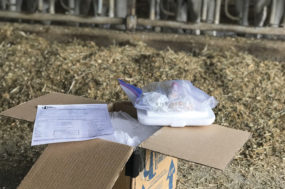It should be one of the happiest days of any parent’s life: the day the son or daughter – the presumptive successor of the family dairy farm – gets married. Often unspoken, the day can also bring worry about the future of the family’s dairy farming legacy.
Taking early planning and legal steps before the walk down the wedding aisle can minimize the damage if a successor dies or gets divorced, according to George Twohig, a partner in the law firm of Twohig Rietbrock Schneider & Halbach S.C., Chilton, Wisconsin.
 Twohig was joined by Wisconsin dairy farmer Ron Brooks in presenting “Before tying the knot: Consider the ins and outs of marital law” during the Professional Dairy Producers of Wisconsin 2017 Annual Business Conference.
Twohig was joined by Wisconsin dairy farmer Ron Brooks in presenting “Before tying the knot: Consider the ins and outs of marital law” during the Professional Dairy Producers of Wisconsin 2017 Annual Business Conference.
Any discussion mixing family, emotions and business can be frightening and is frequently avoided. Add the prevailing stigma of prenuptial or marital property agreements, and the topic can become toxic.
“Many people believe prenuptial or marital planning is inherently unfair to spouses and only about protecting the farm from them,” Twohig said. Instead, it should be viewed as a way to protect and prolong a dairy farm business legacy while treating all people fairly in case something goes awry.
“It’s better to have a clear understanding of what will happen in the event of the successor’s death or divorce so the parents transitioning the farm to the next generation, the successor getting the farm and his or her spouse understand the financial relationship they are getting into,” Twohig said.
Things have changed
In past generations, passing a farm to the next generation was relatively simple. But farm transfers have become more complex, in part, because the numbers are much bigger.
“Today, farms have more cows, equipment, facilities and land, all at inflated values: greater gross income but, often, greater debt,” said Twohig. “When outsiders look at a farm balance sheet, they see a wealthy family.” The farmer may have a large net worth, but that richness is in assets essential to the farm and its future.
“Then, farmers have poor margins that keep cash flow tight,” he continued. “The farm’s limited cash flow has to be used to pay existing debt, replace depreciating assets, make improvements on the farm and pay for family living. When bringing in the next generation, they are adding another family and, for many, that’s a challenging financial burden.”
“The farm must cash flow before, during and after its transfer to the next generation,” Twohig said. And to remain a viable business, the farm must also cash flow after a successor’s divorce, death or exit from the farm.
A farm’s assets, especially land, are also often viewed differently.
“A farmer considers the farm assets as the tools of his or her trade and essential to the family farm legacy; anyone who isn’t a farmer eventually views the assets as an investment,” Twohig said.
“The value of farm real estate only counts three times in your life: when you buy it, when you borrow money and when you sell it. For farmers, it only counts twice: when they buy it or borrow money – because farmers don’t sell it. They transfer it to their successors.”
In contrast, and especially in a divorce situation, the successor’s former spouse may consider the successor’s interest in the farm as an investment in which the spouse deserves a share based on its fair market value. The divorcing spouse often wants to disregard that the successor received farm assets by gift or in a bargain sale.
Add the potential either or both of the attorneys and the judge may know little about farming, farm finances and farm values, the successor has a risk the court will make an unreasonable property division in favor of the spouse, compromising the farm’s future.
Educating the new in-law
Parents have an educational responsibility before their son or daughter walks down the aisle or when the couple will be coming back to the farm.
“To gain the spouse’s support, the parents and successor need to take the time to educate the spouse about the family and farm and how they function,” Twohig said. “A future and present in-law should understand your family and its traditions and how they work, live and communicate within the family and business.”
The spouse must understand not only the successor’s personal and business expectations concerning his or her involvement, management and ownership of the farm, but also the parents’ expectations.
“The spouse must understand what his or her role will be and what it will not be,” Twohig said. “The spouse may want to be actively involved in the management and decision-making, but the successor or parents may not want that involvement.”
The spouse must grasp the nature of the business and finances. The spouse has to understand how the successor, or the couple together, are going to be compensated and that it may be less than the income earned by their non-farm friends.
“The spouse should understand how management and ownership will transition to the next generation and the length of the process,” Twohig said. Given farm cash flow limitations, the spouse should understand farm assets will be transferred to the successor on an “earned” basis by gift or bargain sale to continue the farm legacy and with the expectation the successor will transfer the farm to the next generation.
Understanding is a two-way street. Successful planning also requires the successor (and the parents) to fully consider, recognize and appreciate the spouse’s contributions to the farm and family. That may include his or her contribution in raising and mentoring children and maintaining the family home, which may allow the successor to spend more time on the farm.
The spouse may give up the long weekends and summer vacations enjoyed by non-farm friends. The in-law may provide direct labor or management contributions to the farm business or contribute through income, health insurance or outside investments from off-farm employment.
Brooks, a fifth-generation Waupaca County, Wisconsin, dairy farmer who recently went through a divorce, emphasized the need for a marital property agreement.
He said he didn’t listen to his parents, who urged him to seek a prenuptial agreement, and wasn’t brave enough to initiate the discussion. He also didn’t stay current with assets and property division. He urged others not to make similar mistakes.
“Bring professionals in early and move forward at a reasonable pace,” Brooks said. “If you get everyone in ahead of time, before people are mad at each other, it’s easier to develop a fair plan and do the ‘what ifs’: What if I die? What if we get divorced?”
“It’s OK to separate business and family. Love and trust isn’t enough in the board room,” Brooks said. “In the board room, you need written, concise, legal and fair documents.”
Today, the Brooks Farms business is divided into three limited liability companies (LLCs), including an operating LLC and facilities LLC in which Ron and his on-farm daughter, Zoey, are members; and a real estate LLC, which owns the land base, in which his four daughters are equal members.
Each married daughter’s husband (Brooks’ sons-in-law) has agreed the farm assets will remain the daughter’s individual property.
The daughters not actively involved in the farm’s operation are placeholders. They can’t leverage property or be held liable for it. But Ron and his daughters have a shared commitment to maintaining the farm legacy and to eventually transferring a management and ownership position to any daughter or qualified grandchild who wants to farm – after meeting specified education and experience qualifications.
“(A legacy farm) is the next generation’s asset to grow, nurture and expand, and then give it away. If one generation gets in there, it’s gone,” Brooks said. ![]()
PHOTO 1: Illustration by Fredric Ridenour
PHOTO 2: George Twohig is a partner in the law firm of Twohig Rietbrock Schneider & Halbach S.C., Chilton, Wisconsin. Courtesy photo.

-
Dave Natzke
- Editor
- Progressive Dairyman
- Email Dave Natzke






